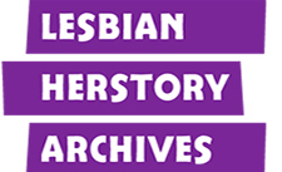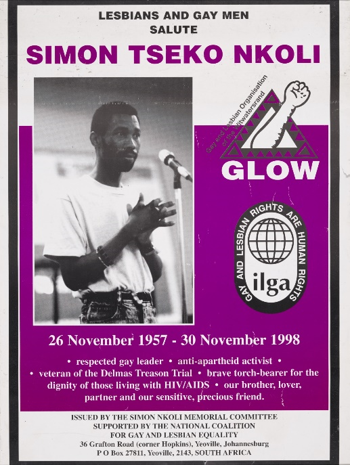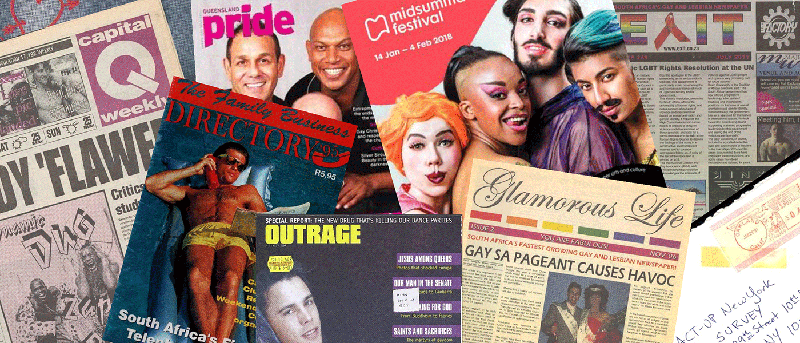Archives of Sexuality and Gender: International Perspectives on LGBTQ Activism and Culture
| By Phil Virta |
International Perspectives on LGBTQ Activism and Culture is made up of three unique archival collections, casting a spotlight on LGBTQ society and experiences, cultural history, and activism in southern Africa and Australia, and presenting lesbian organizational groups and culture from around the world. Read the press release to learn more about this new resource >>

Gay and Lesbian Memory in Action (GALA), Johannesburg, South Africa—GALA is a center for lesbian, gay, bisexual, transgender, intersex, and questioning (LGBTIQ) culture and education in southern Africa. Their mission is to act as a catalyst for the production, preservation, and dissemination of knowledge on the history, culture, and contemporary experiences of LGBTIQ people. GALA was set up to address the erasure of the stories and experiences of LGBTIQ people from official archives, histories, and other spaces in South Africa. From their archives, Gale has digitized 25 collections covering numerous aspects of LGBTIQ life in southern Africa.

Australian Lesbian and Gay Archives (ALGA), Melbourne, Victoria, Australia—ALGA is the only community group in Australia that actively collects and preserves LGBTIQ material from across the country and makes it readily accessible. The collections include material of national or international scope, but the heart of the Archives’ work is the collection and preservation of the historical life of the lesbian, gay, bisexual, and transgender communities of Australia. From the time of the gold rush to the battles against AIDS, the collections save the rich and diverse histories for current and future generations. Gale has digitized a portion of the rich ALGA periodicals collection, providing a window to Australia’s LGBTIQ community and a huge boost for the study of Australian LGBTIQ history and culture.

Lesbian Herstory Archives (LHA), Brooklyn, New York, USA—From the LHA’s statement of purpose: “The Lesbian Herstory Archives exists to gather and preserve records of Lesbian lives and activities so that future generations will have ready access to materials relevant to their lives. The process of gathering this material will uncover and collect our herstory denied to us previously by patriarchal historians in the interests of the culture which they serve. We will be able to analyze and reevaluate the Lesbian experience; we also hope the existence of the Archives will encourage Lesbians to record their experiences in order to formulate our living herstory.” Gale has digitized the Organization Files and Geographic Files from the Lesbian Herstory Archives, providing coverage of issues in activism and culture with a global scope.
Each collection offers unique perspectives on 20th-century LGBTQ culture, herstory, and history. Some highlights follow:

From Gay and Lesbian Memory in Action, we offer The Papers of Simon Nkoli, a prominent South African anti-apartheid, gay and lesbian rights, and HIV/AIDS activist. Charged with treason in 1984 together with 21 other political leaders in the Delmas Trial, Nkoli came out to his fellow trialists while a prisoner. This helped to change the attitude of the African National Congress to gay rights. Following his acquittal and release from prison in 1988, Nkoli founded the Gay and Lesbian Organisation of the Witwatersrand (GLOW). As part of the National Coalition for Gay and Lesbian Equality (NCGLE), he helped in the campaigns to retain the inclusion of the protection from discrimination in the Bill of Rights in the 1994 South African constitution and for the May 1998 repeal of the sodomy laws. Nkoli also helped establish Soweto’s Township AIDS Project (TAP) in 1990; and after becoming one of the first publicly HIV-positive African gay men, he initiated the Positive African Men group based in central Johannesburg. He died in Johannesburg in November 1998.




The Papers of Simon Nkoli cover the most significant period in lesbian and gay political history in South Africa. Its highlight is over 100 letters written during Nkoli’s detention in the Delmas Treason Trial (1985‒1987). These letters are a testimony to Nkoli’s extraordinary courage, and through this personal account give an insight into the day-to-day experience of being in detention. The collection includes other material relating to the Delmas Treason Trial; copies of letters from the international community in response to an Amnesty International Urgent Action appeal; Nkoli’s correspondence with international gay and lesbian organizations; and material that documents the controversy that arose at the 1986 International Gay Association conference around the continued membership of the Gay Association of South Africa.
Another informative collection from GALA is The Papers of Joy Wellbeloved. Joy Wellbeloved (James), together with Marlene* and Michael,* started the Phoenix Society in 1985. At the time (conservative 1980s South Africa), the society aimed to provide a way for white men who dressed in women’s clothing to connect with each other. “Transgender” was not used as a description at the time, but members ranged from transvestites and drag queens to what would today be considered transgender. The Phoenix Society published a quarterly publication called Fanfare from 1985 to 1997. Wellbeloved, as secretary, was a regular contributor, and much of her life story is recorded in the articles she wrote for Fanfare. Wellbeloved went on to have gender-reassignment surgery and lived and worked as a woman in Cape Town from the late 1990s onward. The collection consists mainly of Fanfare magazines/booklets published by the Phoenix Society. The collection also contains interviews, biographical writing, and press about Joy, Marlene, and the Phoenix Society.
*Chosen names.




The Geographic Files, also known as “Lesbians in…,” have been collected since the Lesbian Herstory Archives opened its doors to visitors and researchers in 1976. Visitors to the Archives from all over the globe brought or sent in items, either a single article or a handful of materials from their home state or country, or they provided materials that they picked up while traveling. With coverage spanning into the 2010s, the collection consists of city guides, maps, directories, event flyers, programs, calendars, handbills, local newsletters, and newspaper clippings from Afghanistan to Zimbabwe. This is a great ephemeral collection offering a global view of lesbian history and culture.


The Organization Files, affectionately referred to as the “org file,” from the Lesbian Herstory Archives cover 1,640 organizations ranging from small groups, like the Black Lesbian Study Group in New York, to community centers, such as the Lesbian Resource Center in Seattle. There are files for the LGBT task forces of many national, and some international, professional organizations; for religious, ethnic, and culturally identified groups; and for college groups. The oldest org files are from the Daughters of Bilitis (DOB) and date to the 1950s. Other early records date from the ‘60s and early ‘70s (e.g., DOB, The Women’s Firehouse, Salsa Soul) and continue to the present (Revolting Lesbians, New York, 2018; Rise and Resist, New York, 2017). International organizations represented include Aswat ‒ Palestinian Gay Women (Israel), Grupo Gay da Bahia (Brazil), Les Lesbiennes se déchainent (France), Lesbiradas (Guatemala), LALA ‒ Lesbians Affirming Lesbians in Asia (Japan), Gays and Lesbians of Zimbabwe, and Maori Women’s Center (New Zealand), among others.




From the Australian Lesbian and Gay Archives, we offer the largest available collection of digitized Australian LGBTQ periodicals. The ALGA periodicals collection represents the history of the early gay liberation movement in Australia onward (1970‒present). ALGA and Gale have partnered to digitize more than 150 titles from the collection, with particular strengths in 1970s‒1980s activism, cultural and social history, community newsletters, support groups, the arts and entertainment, and the AIDS crisis.


All six Australian states are represented in the collection, offering LGBTIQ history across the continent.
- Some of the periodicals provide coverage on a national level, such as OutRage, Gayzette, and LOTL (Lesbians on the Loose), and some cover the state level, such as CAMP NSW Newsletter, West Campaigner (Perth), and Speaking Volumes (Adelaide).
- There are also titles specific to the large metropolitan centers, such as Capital Q (Sydney), Queensland Pride (Brisbane), and Now in Melbourne, as well as titles covering various issues, regions, and organizations such as AIDS Action (Canberra), Sydney Gay and Lesbian Mardi Gras Guide, the wonderfully named Pink Thylacines (Hobart), and the fabulous Fruit Juice (aka Tropical Fruits) from Lismore, New South Wales.




The Archives of Sexuality & Gender program proudly represents diversity and inclusivity in all its forms, regardless of race, ethnicity, social class, gender, sexual orientation, or disability. International Perspectives on LGBTQ Activism and Culture ensures marginalized voices are heard, and LGBTQ herstory, history, and culture are preserved. Read Part 2 of this blog series to dive into the history covered by this unique resource.
Learn more about International Perspectives on LGBTQ Activism and Culture >>
Meet the Author
 Phil Virta has worked at Gale for more than 14 years in various capacities, most recently as a publisher of digital primary source archives in charge of the Archives of Sexuality & Gender program. He enjoys long walks through dusty archival collections, visiting far-flung places, and frequent woolgathering. When he doesn’t have his head in the clouds, he can be found researching new archive ideas, working on his stamp collection, watching squirrels, or planning his next tropical vacation. “He was a dreamer, a thinker, a speculative philosopher… or, as his wife would have it, an idiot.” Thank you Douglas Adams.
Phil Virta has worked at Gale for more than 14 years in various capacities, most recently as a publisher of digital primary source archives in charge of the Archives of Sexuality & Gender program. He enjoys long walks through dusty archival collections, visiting far-flung places, and frequent woolgathering. When he doesn’t have his head in the clouds, he can be found researching new archive ideas, working on his stamp collection, watching squirrels, or planning his next tropical vacation. “He was a dreamer, a thinker, a speculative philosopher… or, as his wife would have it, an idiot.” Thank you Douglas Adams.

